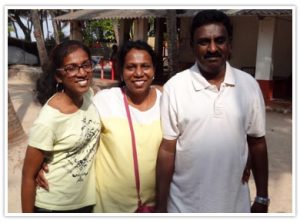So there I was after having written my thesis on how and where teenagers derive their sex deals and now being a life-skills trainer with a baby girl in my arms!
The classroom had shifted location into my house. Walking the talk was my test. It is fun teaching teenagers in schools and colleges and training teachers on this subject of ‘Sexuality education’. The games, the props, and the questionnaires — all tools used in the classroom were not going to be of any use to me in my house.
My little girl was going to be my test!
With absolutely no input about the taboo topic at home, most of us including me are left with the little biology lesson in our schools and the 1-day visit from the gynecologist in the school, scaring preubescent girls on body dynamics.
Whose job is it anyway?
The easy way out is to take the route of our parents who believed that children would learn about their changing bodies as they grow.
Parents want the school to do the job. The teachers in schools want a doctor to do the job. And by the time our kids are 10 and we have been passing the responsibility around, our kids have “acquired” a great deal about the ‘facts of life’.
At 5, a little boy comes running to his mom or dad asking what is this advertisement all about (a sanitary napkin)? He is so excited that he has seen this product in his house! He jumps up and down and then goes to the parent and asks, “What is this? What is it used for?” Mom and dad wish the ground would open up and swallow them as mom starts stuttering, offers no eye contact, looking all very cross, and says, “It’s nothing. Go play.”
One of the initial responses that we as parents have is that we do not talk about our bodies in our homes unless it has to do with sickness.
Our next response as progressive parents of this ‘era’ is that the mother talks to the daughter and the father talks to the son, both dreading that 1 hour when she/he sits down the child and gives the ‘facts of life’, always looking at the clock and wishing it ticks faster.
One thing that I often teach parents is that it is the responsibility of both parents to talk to children of both genders.
Another point that I would like parents to consider is please do not think of our role as a dreaded 1-hour conversation to be had with our child when he/she is 10 or 11 years of age.
Sex-education vs. Sexuality education
Let us look at this topic as “sexuality education” and not ‘sex-education”. While you can cover sex- education in 1 hour, sexuality education is a life-long teaching process.
Sexuality education should begin when our child is around 2-3 yrs of age.
Sexuality education is a holistic approach. It is not exclusively a lesson on biology. It begins with our values; the values that we want our children to know and uphold. So, if we want our 2-year-old to commit to future values of respecting and loving our God-given physical bodies to abstinence and chastity before marriage, our sexuality education begins then.
Sexuality education involves teaching body hygiene when the child is very young as early as 2 or 3 using the correct names to name all body parts.
When my daughter was 1, she started pointing out to her body parts as we delighted parents would ask her questions. “Baby, where are your eyes?” How we clapped and encouraged her as she pointed out to her eyes.
We covered the head, the fingers, the toes, and also the “bum”. Yes!! That’s the word we used in our home. The textbooks and sexuality-education manuals that I helped compile did not have that word. But then as a parent in my home what was I supposed to teach my daughter. I sure did not want to be discreet and tell her that it is her ‘back’. And I knew for sure that she would be picking up words like ‘butt’ and ‘tushy’ as she grew.
The language and the naming of body parts kept changing in our home as our daughter was growing. By the time she was 7 years, we were comfortable with words like ‘vagina’ and ‘penis’.
Encouragement to parents – We can shed off our inhibitions, embarrassments and fears when we start sexuality education at a young age in our homes.
 Protecting our children
Protecting our children
Sexuality education involves protecting our children by teaching them about ‘friendly’ and ‘unfriendly’ people.
So, when we tell them not to talk to strangers, we need to give them a reason. As early as the child is 2, we need to teach them to protect their bodies from scrapes and bruises. We can tell them that scrapes and bruises can also be caused when strangers or even friends touch the body in places that can cause bruises.
Without scaring them, in a very straight voice, we can tell them – NO one should touch your bum. NO one should remove your clothes. Teaching the ‘good’ touch and ‘bad’ touch by friends, relatives and strangers can progress to words like molestation and rape when our child is 11 or 12.
By the time, our children understand ‘good’ touch and ‘bad’ touch, he/she understands all the scenes in the movie. They are hearing the words on the TV and also beginning to get some sense of right and wrong based on the values that we teach in our homes. Thanks to our media, video games and the internet, our 5-year-olds learn and understand a lot about sex, sexual violence, and sexually offensive vocabulary.
As parents we are racing against the media and Internet to instill family and personal values and principles in the lives of our children.
Speaking to our children
Sexuality education involves speaking to our children about their changing bodies. When it is a 1-hour talk that you want to have, then this can become embarrassing for both the mother and the father.
I started speaking to my daughter when she was 6 years old on how her body was going to change. At first, I teased her about how tall she would be when she grows up, how long her hair would be, how pretty she would be, how big her breasts would get. “Mama!!!” Oh yeah! That’s what got her attention.
I started telling her about how girls grow taller sooner than boys. Boys grow tall only after they are 14 years. And then I used the names of her friends who are boys. I would make our talk humorous and personal by involving her contemporaries — people whom she could relate to.
Every opportunity was used to talk about the changing body. Any advertisement on TV, I would use to talk to her.
Pimple cream – “Baby did you know that when boys and girls start this phase called puberty, they might pimples on their face?”
Sanitary napkin – “Hey this is something that I need to tell you. When you get your period, I think I am going to get you Whisper! And as casually as that I introduced the word ‘period’ to her.”
Parents, let me encourage you. You need not give a detailed reply to your children when they are 5, 6, or 7; but you need to give them a reply. Don’t brush them off. Your simplest reply will be satisfying to them. The moment we brush off their question, the sense of something ‘not to be spoken about’ sets into them. And then they will learn about it from their friends and TV and internet in a manner that causes them to not talk about it with you.
By the time, my daughter was 10, I knew I had tell her about puberty. Our night times were conversation times when we spent talking. My husband has always worked away from home. He would come home just once or twice a month. So that left only me to speak to her. But the level of comfort that I built with her all through the 10 years of her life, made it easy for me to make that progression. And this I remember telling her very clearly, “Baby do you remember I told you that Whisper is used to keep the body dry against something. Well, let me tell you about it.”
And that’s how I did it, lying on the bed, no table to separate us, wrapping my hand around her; I spoke to her about the onset of periods among girls. I spoke to her about the 5-day period of menstruation. This talk had the use of all the right words: breast, vagina, etc. My talk with her was not only about her changing body. I spoke to her about the onset of puberty for boys.
She was frightened when I mentioned about the flow of flood. I kept re-assuring her very calmly that all her fears were legitimate. I told her how her cousin cried when she got her first period when she was just 10 years old. I spoke to her about my first period. Over the next 1 week, most of our bedtime conversations revolved around ‘periods’ and puberty.
She was settling in with the idea, when the next week, a team of gynecologists visited her school. I am so glad that I spoke to her before the doctors in school did. She felt confident that they taught her something she had heard of at home. She was not frightened this time.
That day my husband was home and we had gone to pick her up from school. Our daughter, runs towards our car flashing and waving the complimentary pack of sanitary napkins, shouting happily, “Dada, look what they gave us at school”. Gosh, you guys should have seen my husband’s face! He blushed furiously with embarrassment. He clamped his mouth shut. His hands tighter on the steering wheel, he looked straight ahead and drove.
Walking the talk – the dada in my house, a shy person by nature; though he grew among 3 sisters, was so uncomfortable to even look at our daughter.
Dads and moms try your very best!!!
While we girls chatted away in the car, my husband was so embarrassed. I asked my daughter, “Baby, did the doctors teach you the way mama told you?” She replied, “Mama, they were better than you!” So much for being a sexuality educator in schools and colleges! I consider myself a privileged parent to walk with my daughter through her pubescent woes.
Preparing our child for adulthood
Sexuality education involves preparing our child for adulthood. Our talks continued and entered a new dimension. We started talking boyfriends. Now all these girls had a crush on this one guy in church. She was as casual as, “O mama, we all like him! He is so cute!”
So our talks revolved around boyfriends, dating and marriage. We spoke about abstinence, premarital sex, pregnancy, abortion, contraception— almost all topics relating to adulthood, before she was 15. We have a comfort level as that between friends. As a teenager, her life has been changing ours.
As parents, we have learnt to shuffle between being a parent and a friend. Now, this is where my husband steps in. While he is uncomfortable addressing the body, he is extremely comfortable talking to our daughter about dating, marriage, etc.
One of things that I tell her regularly is “Baby, please don’t forget that you need to tell your babies all about this”. She wants to have 3 children. I keep telling her that she should talk to her children openly about our body and sexuality. Am I crazy to be telling her this at this age? I don’t think so.
Our daughter is now 16, soon to be 17 in November. She is a class 12th student of Commerce – Junior college here in Mumbai. As parents both of us feel as if she has been thrown among wolves after having held her hands and leading her for 15 years. Now, we cannot be holding her hand. She is already a net-savvy person. She is glued to her cell phone. She is on social networking sites. She is an avid reader. She has loads of friends.
Our daughter is an independent individual now. She has choices to make. As parents we have taught her right from wrong. Does this make it easier for her? No! Her world teaches her many things that are not in sync with what we have taught her.
Parenting is a privilege!! I have loved parenting our daughter!! Our squabbles are a nightmare. Our ‘group hugs’ (husband, her and me), which she insists on, are a treat.
Parents, caregivers—it is not just about physical bodies that we are talking! We are talking about influencing an entire lifestyle. We create a bond by talking about the physical body with our children! Let us not shy away froms this. If not in our homes, our children will learn all about sex and sexuality from the walls of public toilets and other places.
It is our body. There’s nothing to be ashamed of. Take the first step and talk about it!






Leave a Comment